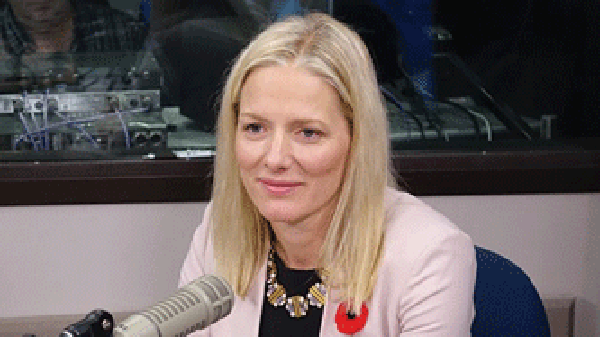News & Articles
Browse all content by date.

Canada’s Minister of the Environment, the Hon. Catherine McKenna, has issued a stinging critique (http://www.ceaa-acee.gc.ca/050/document-eng.cfm?document=104963) of the federal Joint Review Panel’s “Assessment Report” which last year recommended that she approve the so-called “Deep Geologic Repository” proposed by the Canadian nuclear giant Ontario Power Generation (OPG) for the shore of Lake Huron.
Sent from the Canadian Environmental Assessment Agency in Ottawa, Minster McKenna’s Feb. 18 letter (http://www.ceaa-acee.gc.ca/050/document-eng.cfm?document=104964) declares that “further information and studies are required” before she can issue a formal Decision Statement regarding the proposed near-lake radioactive waste dump. Her decision had previously been due March 1, 2016, but will now be delayed indefinitely.
Elated by the postponement and by Minister McKenna’s critical demands, Michael Keegan, Chair of the Coalition for a Nuclear Free Great Lakes in Monroe, Michigan wrote, “Ding dong the DUD is dead--almost!”—referring to what critics have dubbed the “Deep Underground Dump.” The Minister’s notice could be a major blow against the plan.
In what’s been called the most counter-intuitive and irrational radioactive waste disposal scheme ever proposed, OPG wants the government to allow burial of every sort of radioactive waste except fuel rods, a mere 1.2 kilometers from the shore of Lake Huron. The waste materials would be from OPG’s eight-reactor Bruce Nuclear Generating Station, on Bruce Peninsula northwest of Toronto. With five operating reactors and 3,800 employees, OPG’s Bruce complex is the world’s largest nuclear site. Japan’s Kashiwazaki-Kariwa complex is bigger, but has been closed since the Fukushima catastrophe of March 2011.
The proposal has so shocked and angered local residents, environmentalists, US neighbors and even some of their Congressional representatives, that opposition has become international in scope. Some observers speculate that Justin Trudeau, newly elected as Prime Minister in October 2015, may have played a part in the Ministry’s distinctly critical announcement.
As many as 40 million people rely on the Great Lakes for drinking water, and in 70 years of nuclear waste generation, no government has ever considered, much less allowed the disposal of it so close to one of the Great Lakes. OPG’s “geologic” rationale for the near-lake dump has been condemned as a subterfuge for cost-cutting, since its proposed location, right next to the company’s 2,300-acre site, would save the firm the enormous expense of high-tech packaging, high-tech transportation, and highly-engineered waste management at an alternate site, presumably one with less population and less water.
Minister Wants New Studies of Alternative Dump Sites, Potential Pollution, and Clean-up Plans
The first demand Minister McKenna made in her Feb. 18 notice to OPG was that the company conduct a study of alternative locations for the DUD that are “technically and economically feasible.” McKenna explicitly directed OPG to suggest “actual locations” that would meet required feasibility specifications, and to detail the costs and risks of “additional off-site transportation of the nuclear waste.”
Minister McKenna further demanded an “updated analysis of the cumulative environmental effects of the project”—a study that could take a considerable amount of time. Thirdly, the Minister instructed OPG to produce a new “list of mitigation commitments for each identified adverse effect.”
The Minister’s Feb. 18 letter indicated some skepticism toward OPG’s previously submitted technical documents. McKenna wrote demanded that, “OPG shall identify outdated or redundant commitments that were previously brought forward.”
McKenna gave the reactor operators at OPG until April 18, 2016 to provide her with its timeline for concluding and submitting the additional studies and information.
Dozens of communities, environmental groups and politicians on both sides of the Canada-U.S. border have declared their opposition to the DUD, including Toronto, Chicago, and Duluth. Most critics have complained that the proposal is inadequate, dangerous, and unnecessary.
“Company” towns close to the massive reactor complex, like Huron-Kinloss, tend to endorse the plan. Its Mayor Mitch Twolan supports the idea even though he is chair of the Great Lakes and St. Lawrence Cities Initiative, a 100-mayor group that has formally resolved against it.
Anne Eadie, Mayor of Kincardine, Ontario, the site of lengthy public hearings on the proposal, told the Owen Sound Sun Times she thinks OPG’s information is good. “We’re satisfied that the science is there,” she said.
Jutta Splettstoesser, a Kincardine resident, community organizer and vigorous critic of the plan isn’t surprised that mayors of towns near the area’s major employer endorse the company’s dumping scheme. “They’re inside the bribery zone,” she said.
| Tweet |

